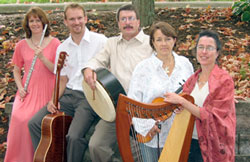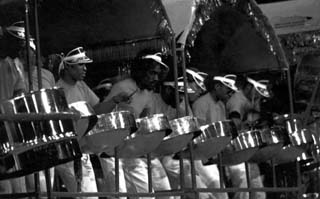Ireland Program
 The Ireland program is an introduction to Irish Traditional Music and its creative process as well as the study of the cultural aspects of Ireland and how it relates to the different styles of Irish Traditional Music. The class spends two+ weeks in Ireland. Part of the program is in-residence at the University College Cork where the students attend daily lectures and master classes. All participants also study the Irish whistle as well as take at least 2 private one hour lessons on their major instruments (whistle, Irish flute, uillean pipes, Irish harp, bodhran, set dancing, step dancing (old style), Sean-N?s singing, guitar, button accordion, concertina, piano and fiddle) The students will visit several local pubs to observe and hear the variety of styles of Irish music. Weekend excursions are planned to popular geographical and historical sites. The program will spend time in Dublin, and Cork. Participants do not have to be music majors but do need to have a proficiency on an instrument, voice or dance. It is not necessary to read music since Irish Traditional Music is mainly taught by ear.
The Ireland program is an introduction to Irish Traditional Music and its creative process as well as the study of the cultural aspects of Ireland and how it relates to the different styles of Irish Traditional Music. The class spends two+ weeks in Ireland. Part of the program is in-residence at the University College Cork where the students attend daily lectures and master classes. All participants also study the Irish whistle as well as take at least 2 private one hour lessons on their major instruments (whistle, Irish flute, uillean pipes, Irish harp, bodhran, set dancing, step dancing (old style), Sean-N?s singing, guitar, button accordion, concertina, piano and fiddle) The students will visit several local pubs to observe and hear the variety of styles of Irish music. Weekend excursions are planned to popular geographical and historical sites. The program will spend time in Dublin, and Cork. Participants do not have to be music majors but do need to have a proficiency on an instrument, voice or dance. It is not necessary to read music since Irish Traditional Music is mainly taught by ear.
 The Ireland Program consists of two 2hr. courses offered during the first summer session. Introduction to Irish Traditional Music (3530 or 5530) and The Creative Process in Irish Traditional Music (3531 or 5531). Honors credit is available for these courses.
The Ireland Program consists of two 2hr. courses offered during the first summer session. Introduction to Irish Traditional Music (3530 or 5530) and The Creative Process in Irish Traditional Music (3531 or 5531). Honors credit is available for these courses.
The course objectives are to introduce students to Irish Traditional Music through hands on approach with performances and interactions with Irish musicians. There are orientation sessions during the spring semester that will introduce the students to the Irish whistle and the cultural aspects of Ireland.
Faculty include: Dr. Nancy Schneeloch-Bingham, Professor of Flute, and Ms. Mary Mitchell-Ingoldsby, Professor, University College Cork, Ireland
Trinidad and Tobago Program
 This Trinidad and Tobago program is the study of the culture and music of this Southern most Caribbean country of the West Indies. Trinidad is the home of the steel drum. The class takes place on the campus of West Indies University, St. Augustine, Trinidad. Students have access to the library, computer labs, music department and musical instruments (pans). The following topics are explored: the "creol" society of Trinidad and Tobago (African, Indian and Asian), carnival, mas' camps, calypso/soca music, panyards, steel drum making/tuning. The class also flys to the island of Tobago for a long weekend.
This Trinidad and Tobago program is the study of the culture and music of this Southern most Caribbean country of the West Indies. Trinidad is the home of the steel drum. The class takes place on the campus of West Indies University, St. Augustine, Trinidad. Students have access to the library, computer labs, music department and musical instruments (pans). The following topics are explored: the "creol" society of Trinidad and Tobago (African, Indian and Asian), carnival, mas' camps, calypso/soca music, panyards, steel drum making/tuning. The class also flys to the island of Tobago for a long weekend.
The Trinidad and Tobago Program consists of two 2hr. courses offered during the first summer session. Trinidad and Tobago: It's Culture, It's Music (3530 or 5530) and The Development and History of the Steel Drum (3531 or 5531).
 The course objective is to introduce students to Trinidad/Tobago's diverse culture and music through a hands on approach with performances and interactions with Trinidad/Tobago musicians and artists. There are orientation sessions during the spring semester that introduces the students to the steel drum and the cultural aspects of Trinidad/Tobago. The students return with a better understanding of carnival and the incredible importance the steel drum and its music has/had on the cultural socioeconomic development of Trinidad/Tobago. Students acquire basic skills on a variety of steel drums and basic mask making techniques used in the "mas camps" for carnival. This is a 4 hr. course that takes place during the first summer session. No musical background is required.
The course objective is to introduce students to Trinidad/Tobago's diverse culture and music through a hands on approach with performances and interactions with Trinidad/Tobago musicians and artists. There are orientation sessions during the spring semester that introduces the students to the steel drum and the cultural aspects of Trinidad/Tobago. The students return with a better understanding of carnival and the incredible importance the steel drum and its music has/had on the cultural socioeconomic development of Trinidad/Tobago. Students acquire basic skills on a variety of steel drums and basic mask making techniques used in the "mas camps" for carnival. This is a 4 hr. course that takes place during the first summer session. No musical background is required.
Faculty include: TBA (HSoM Faculty) , Dr. Anne Osborne, Professor at the University of the West Indies and Mr. Jessel Murray, Professor at the University of the West Indies.